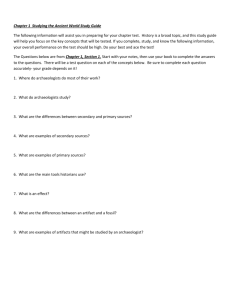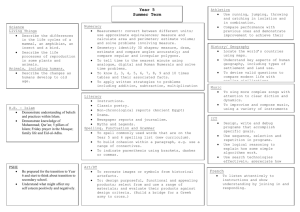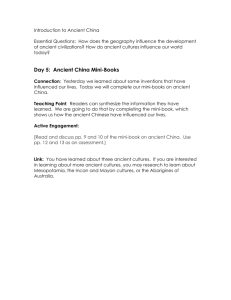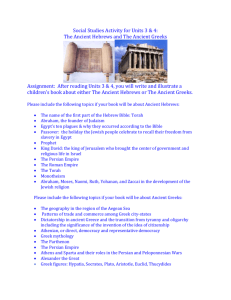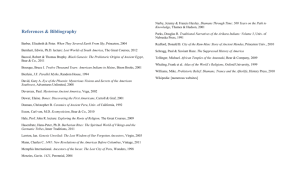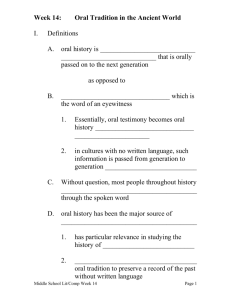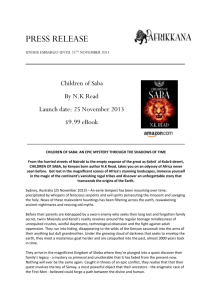Syllabus World Literature
advertisement
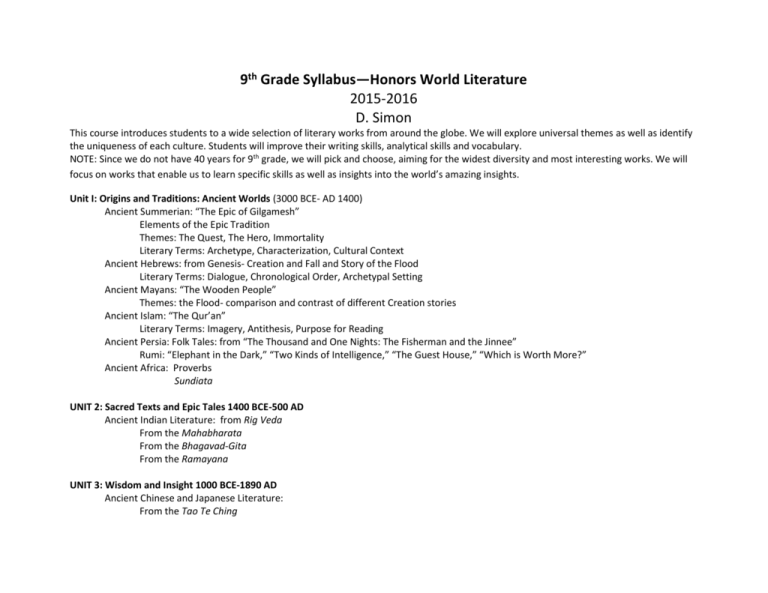
9th Grade Syllabus—Honors World Literature 2015-2016 D. Simon This course introduces students to a wide selection of literary works from around the globe. We will explore universal themes as well as identify the uniqueness of each culture. Students will improve their writing skills, analytical skills and vocabulary. NOTE: Since we do not have 40 years for 9th grade, we will pick and choose, aiming for the widest diversity and most interesting works. We will focus on works that enable us to learn specific skills as well as insights into the world’s amazing insights. Unit I: Origins and Traditions: Ancient Worlds (3000 BCE- AD 1400) Ancient Summerian: “The Epic of Gilgamesh” Elements of the Epic Tradition Themes: The Quest, The Hero, Immortality Literary Terms: Archetype, Characterization, Cultural Context Ancient Hebrews: from Genesis- Creation and Fall and Story of the Flood Literary Terms: Dialogue, Chronological Order, Archetypal Setting Ancient Mayans: “The Wooden People” Themes: the Flood- comparison and contrast of different Creation stories Ancient Islam: “The Qur’an” Literary Terms: Imagery, Antithesis, Purpose for Reading Ancient Persia: Folk Tales: from “The Thousand and One Nights: The Fisherman and the Jinnee” Rumi: “Elephant in the Dark,” “Two Kinds of Intelligence,” “The Guest House,” “Which is Worth More?” Ancient Africa: Proverbs Sundiata UNIT 2: Sacred Texts and Epic Tales 1400 BCE-500 AD Ancient Indian Literature: from Rig Veda From the Mahabharata From the Bhagavad-Gita From the Ramayana UNIT 3: Wisdom and Insight 1000 BCE-1890 AD Ancient Chinese and Japanese Literature: From the Tao Te Ching From the Analects Chinese poetry: T’ao Ch’ien, Li Po, Tu Fu Japanese Tanka and Haiku (various) Japanese- The Pillow Book- Sei Shonagon Zen Parables/ Buddhism UNIT 4: Classical Civilizations 800 BCE- 500 AD Ancient Greece and Rome From the Iliad (one selection) Sappho and Pindar From the Apology- Plato (selection) Sophocles Oedipus the King (act out) Ancient Rome: Ovid: Story of Daedalus and Icarus UNIT 5: From Decay to Rebirth 450-1300 The Middle Ages- Europe French: From the Song of Roland German: from the Nibelungenlied England: Marie de France (French speaking English court)- “Lay of the Werewolf” Italy: Dante Alighieri The Divine Comedy- Inferno Unit 6: Rebirth and Exploration 1300-1800 The Renaissance and Rationalism Italy: Petrarch Giovanni Boccaccio- the Decameron “Federigo’s Falcon” Spain: Cervantes from Don Quixote France: Voltaire- from Candide UNIT 7: Revolution and Reaction 1800-1890 Romanticism and Realism Goethe- from Faust Beaudelaire- The Albatross France: Guy de Maupassant “Two Friends” or other Russia: Leo Tolstoy, Anton Chekhov Norway: Ibsen- A Doll House (perform?) listen to Peer Gynt Suite? UNIT 8: From Conflict to Renewal 1890-1945 The Modern World Czech: Kafka- Metamorphosis Novel: Remarque: All Quiet on the Western Front Spain: Fedrico Garcia Lorca/ Juan Ramon Jimenez Egypt/Greece: Cavafy Chile: Gabriela Mistral India: Tagore The Artist UNIT 9: Voices of Change 1946- Present The Contemporary World Columbia: Gabriel Garcia Marquez- (One Hundred Years of Solitude- if possible!) “The Handsomest Drowned Man in the World” Caribbean: Jamaica Kincaid- from Annie John: A Walk to the Jetty France: Albert Camus: “The Guest” WWII: Primo Levi, Elie Wiesel, Nelly Sachs Russia: Milosz, Szymborska Solzhenitsyn, Yevtushenko (Maybe get One Day in the Life of Ivan Denisovich) Egypt: Mahfouz Israel: Ravikovitch, Amichai South Africa: Gordimer, Achebe Vietnam: Nguyen Thi Vinh China: Bei Dao Fuji: Shu Ting



